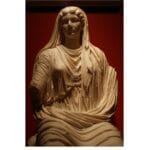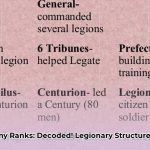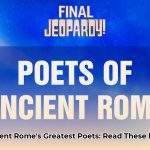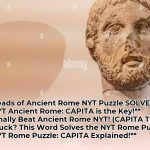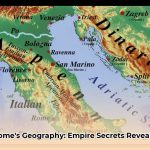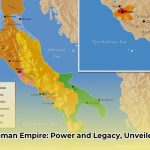Ever wondered what the Romans were really like beyond tales of gladiators and emperors? Delve into their poetry, and you’ll find the soul of an empire. These poets of ancient Rome were not merely scribes; they were foundational figures, shaping an empire’s identity, grappling with profound questions of existence, and crafting narratives so compelling they resonate through millennia. From Virgil, the ultimate architect of Roman self-perception, to Ovid, the witty master of myth, and Catullus, the voice of raw human emotion, we journey into the pantheon of Roman verse. We will examine how their words molded their world, and how they continue to influence our understanding of humanity centuries later.
A Journey Through Ancient Roman Literary Brilliance
The world of ancient Rome, though distant, continues to speak to us through its enduring literary heritage. The poets of this era, through their mastery of language and profound insights into the human condition, created works that remain pivotal in Western culture. But who were these literary giants, and what makes their contributions so remarkably enduring? Let us explore the most influential voices in Roman poetry, uncovering their unique genius and the reasons for their timeless appeal, and understand the foundations of Roman literature and its lasting impact on Western civilization.
#1: Virgil – The Epic Architect of Roman Identity
At the zenith of Roman literary achievement stands Publius Vergilius Maro, universally known as Virgil (70–19 BCE). Far more than a mere wordsmith, Virgil was a cultural architect whose magnum opus, the Aeneid, served as the foundational epic for Roman identity. This heroic poem narrates the arduous journey of Aeneas, a Trojan prince destined to voyage to Italy and lay the groundwork for Rome. It is a narrative meticulously steeped in core Roman virtues: pietas (duty to gods, family, and country), gravitas (dignity, seriousness), and virtus (manliness, excellence, courage). The Aeneid quickly became the national epic, crystallizing how Romans perceived themselves and their pivotal role in the sweep of history, effectively serving as propaganda for the Roman Empire under Emperor Augustus’s reign, who heavily patronized Virgil.
Beyond the Aeneid, Virgil also penned the Eclogues (or Bucolics), a collection of ten pastoral poems idealizing rural life and often featuring allegorical figures, and the Georgics, a didactic poem in four books on agriculture. The Georgics not only offers practical advice on farming but also portrays rural life as a noble endeavor and a metaphor for human labor, emphasizing the profound connection between man and nature.
Virgil’s influence is colossal, setting an unparalleled benchmark for literary endeavor for centuries. Subsequent poets, scholars, and artists invariably looked to Virgil as the ultimate exemplar of poetic excellence. His works became central to Roman education and profoundly influenced medieval and Renaissance writers, most notably Dante Alighieri, who famously featured Virgil as his guide through Hell and Purgatory in the Divine Comedy. To truly grasp the essence of Rome – its values, aspirations, and profound legacy – an engagement with The Aeneid is indispensable. It remains a timeless testament to classical antiquity and its enduring power.
#2: Horace – The Master of Lyrical Verse and Social Commentary
Key Takeaways:
- Horace (Quintus Horatius Flaccus, 65–8 BCE), born the son of a freedman, ascended to become a preeminent poet during the transformative Augustan Age, embodying the Roman spirit.
- He skillfully integrated sophisticated Greek literary traditions with distinctly Roman values and themes, creating a unique synthesis in Latin poetry.
- His comprehensive body of work, including Odes, Satires, and Epistles, offers profound personal reflection and incisive philosophical thought.
- Horace’s verse provides invaluable insight into the complex sociopolitical climate of his era, detailing Augustan Age nuances.
- His unparalleled mastery of language and deep exploration of human nature contributed to his enduring and widespread influence on Roman literary figures.
- Iconic phrases like “carpe diem” (“seize the day”) originating from his writings remain culturally resonant and widely quoted today.
Following Virgil, we encounter Horace, a virtuoso of lyrical verse and a keen observer of Roman society. Have you ever considered how the son of a freed slave could ascend to become one of Rome’s most celebrated poets? Quintus Horatius Flaccus achieved precisely that. He expertly navigated the profound transition from the Roman Republic to the burgeoning Empire, wielding a pen imbued with both wit and profound wisdom. Educated meticulously in Rome and later in Athens, his work ingeniously synthesized Greek literary forms with uniquely Roman thematic concerns, capturing the very essence of his turbulent yet vibrant era. His early life set him apart from many ancient Roman writers.
Consider Horace as the quintessential networker of his time. His deep friendships and professional relationships with influential figures like Virgil and Maecenas, a highly wealthy and influential patron of the arts, opened crucial doors to elite circles. This patronage was instrumental in shaping his literary trajectory, providing him with a vital platform to explore the intricate complexities of his contemporary society. His poetry is a fascinating amalgam of personal introspections, philosophical contemplations, and sharply observed commentary on the evolving socio-political landscape. This connection to the Roman Empire’s elite underscores his unique position. [^1^]
What distinguishes Horace’s poetic contributions? His Satires offer profoundly intellectual and witty critiques of human folly, prevailing morality, and political maneuvering. These pieces could be likened to a sophisticated Roman form of social commentary, akin to a philosophical stand-up routine, yet imbued with much deeper meaning. Conversely, his Odes, short and intensely personal poems, offer vivid vignettes of life during the reign of Emperor Augustus. They exemplify a true masterclass in harmoniously blending Greek lyrical structures with distinctly Roman content, gracefully navigating complex themes such as love, mortality, friendship, and the pursuit of a balanced, philosophical life. Did these works resonate profoundly with Roman culture? Absolutely. They swiftly became indelible cultural touchstones, shaping Roman values. Beyond his immediate poetic output, his Epistles, written in verse, offer philosophical reflections on how to live a good and balanced life. His Ars Poetica provides invaluable behind-the-scenes insights into the craft of writing itself, outlining principles of good writing that subsequently influenced generations of aspiring authors and contributed to the body of classical literature.
Here is an intriguing paradox: Horace initially served as a military tribune, fighting against Octavian (who would become Emperor Augustus) at the Battle of Philippi. What an extraordinary career trajectory! He later transformed into a celebrated poet under Augustus’s direct patronage. This transition showcases his incredible capacity for navigating the treacherous waters of imperial power with both remarkable grace and astute diplomacy. It truly makes one ponder: how did he achieve such a seamless adaptation within a highly volatile political climate? His journey highlights the complex relationship between power and art in ancient history.
Horace’s impact on Western thought and literature is undeniably profound. His work has been admired and studied by literary giants across centuries, including Dante Alighieri, Petrarch, Ben Jonson, Alexander Pope, and Samuel Johnson. Iconic phrases such as “carpe diem” (“seize the day”), meaning to “pluck the day” or “make the most of the present moment,” continue to echo through modern culture, serving as a testament to his profound and enduring influence. He was not merely a poet; he evolved into a cultural phenomenon, forever altering the landscape of Roman culture. Ultimately, Horace stands as irrefutable proof of the enduring power of wit, profound wisdom, and remarkable adaptability in the face of monumental societal change. His sophisticated verse continues to offer us a revealing glimpse into both the universal human condition and the vibrant, intricately complex society that profoundly shaped him.
#3: Ovid – The Witty Storyteller and Mythological Innovator
Key Takeaways:
- Ovid (Publius Ovidius Naso, 43 BCE–17/18 CE) was a crucial figure in Roman literature, celebrated for his extensive versatility and profound impact on Western culture across different historical periods.
- His masterpiece, Metamorphoses, ingeniously weaves together over 250 myths with central themes of transformation, love, and subtle irony, showcasing innovative storytelling.
- Ovid’s complex relationship with Emperor Augustus significantly influenced his work, especially after his forced exile, revealing exile secrets.
- Ovid’s nuanced exploration of love in his various works ranged from playful and subversive to deeply instructive and philosophical.
- His sudden and harsh exile marked a pivotal turning point, deeply infusing his later writing with themes of profound personal loss and displacement.
Imagine a poet capable of infusing ancient myths with unparalleled wit and innovation. That figure is Ovid. His Metamorphoses stands as a monumental collection of myths, ingeniously retold with characteristic flair, imagination, and a subtle touch of irreverence. Ovid was not content merely to recite traditional tales; he masterfully reimagined them, blending various legends into a vibrant tapestry of human and divine experience. His work explores universal themes: love, loss, profound change, and the transformative power of art.
The multifaceted appeal of Ovid continues to resonate powerfully through the ages. From the sweeping mythological narratives of Metamorphoses to the famously witty and occasionally scandalous advice in Ars Amatoria, his poetry is simultaneously celebrated and, at times, controversial. Traces of Ovid’s profound influence can be found pervasively across various domains: in academia, where his Latin texts are considered vital for classical studies, and more broadly in popular culture, exemplified by modern adaptations such as Ted Hughes’s poetic interpretations or Mary Zimmerman’s acclaimed stage play, Metamorphoses. His enduring presence solidifies him as a key Roman literary figure.
Metamorphoses is, without exaggeration, a monumental achievement in epic poetry. This singular narrative ingeniously blends over 250 distinct myths into one continuous, flowing narrative. Composed around 8 CE, this epic poem spans 15 books and comprises nearly 12,000 dactylic hexameter lines, with the overarching theme of transformation serving as its central artistic motif. Unlike traditional epics, Ovid masterfully interweaves elements of elegy, tragedy, comedy, and satire, rendering it remarkably accessible to a wide array of readers. Furthermore, he skillfully bridges the gap between ancient myth and Roman history by integrating Roman foundation myths with references to historical figures. Did you ever notice his pervasive use of irony? Ovid subtly challenges conventional views and traditional morals, prompting readers to engage with his narratives on a subtly critical intellectual level. This showcases his command of Latin literary forms.
How did Ovid’s sophisticated poetry relate to the formidable influence of Emperor Augustus? In contrast to earlier poets like Virgil or Horace, Ovid matured under a firmly established principate, a stable imperial system that profoundly shaped the thematic concerns and stylistic nuances of his verse. His later poems, penned during his period of exile, poignantly transform grand imperial themes into expressions of deeply personal suffering. His banishment forced him to confront the stark margins of Rome’s vast empire. He experienced profound creative stifling in what he perceived as a culturally barren land, a stark reminder of the Roman Empire‘s reach.
Ovid’s treatment of love is remarkably complex and multifaceted – simultaneously playful, subtly subversive, often overtly instructive, and deeply philosophical. His key works, including Amores, Heroides, Ars Amatoria, and Remedia Amoris, meticulously explore various dimensions of human affection and romantic entanglement. Amores features vivid love poems chronicling his perhaps fictionalized affair with Corinna. Ars Amatoria, famously dating back to 2–1 BCE, is historically precise in its advice on seduction and relationships. Its notably irreverent and pragmatic view on romantic entanglements is widely believed to have significantly contributed to the reasons behind his later, dramatic exile, exposing some exile secrets. Other notable texts by Ovid include the Fasti, based on the structure of the pagan Roman calendar, detailing Roman festivals and their origins.
Ovid’s abrupt and harsh exile in 8 CE irrevocably altered his life and artistic output. Major scholars widely hypothesize that this banishment was triggered by “a poem and a mistake,” hinting at the controversial Ars Amatoria and an unspecified high-profile scandal involving the imperial family. This sudden exile infused his subsequent writing with a profound sense of personal loss, acute longing, and displacement. Although Metamorphoses was most likely completed before his banishment, its overarching themes of ceaseless change and transformation resonate powerfully with his lived experiences in forced separation. During his period of exile in Tomis (modern-day Constanța, Romania), Ovid penned the poignant Tristia (“Sorrows”) and Epistulae ex Ponto (“Letters from the Black Sea”), works that overtly express his deep sadness and unrelenting plea for recall. Yet, even these outwardly despairing works are recognized by scholars as meticulously crafted literary endeavors that skillfully narrate and shape his unique experience of exile, showcasing his innovative storytelling even in adversity.
Ovid’s profound impact on Western culture is immeasurable. The Renaissance period, in particular, saw countless artists and writers inspired by his rich mythological stories, resulting in some of the most iconic works of art and literature. So, how did Ovid influence Renaissance art and thought? His Metamorphoses was not merely a collection of myths; it functioned as a vital mythological encyclopedia. Renaissance artists enthusiastically absorbed its content, finding abundant inspiration in Ovid’s compelling tales of gods, heroes, and their often dramatic physical transformations. Consider iconic paintings depicting Daphne’s metamorphosis into a laurel tree or Actaeon’s transformation into a stag; these visual narratives owe an immense debt to Ovid’s vivid and imaginative storytelling. Indeed, Metamorphoses provided the very DNA for representing classical mythology within the burgeoning art scene of the Renaissance, demonstrating innovative storytelling that transcended eras. Even today, Ovid’s influence remains palpable, with his enduring stories and themes continuing to resonate within contemporary literature and art, solidifying his literary legacy.
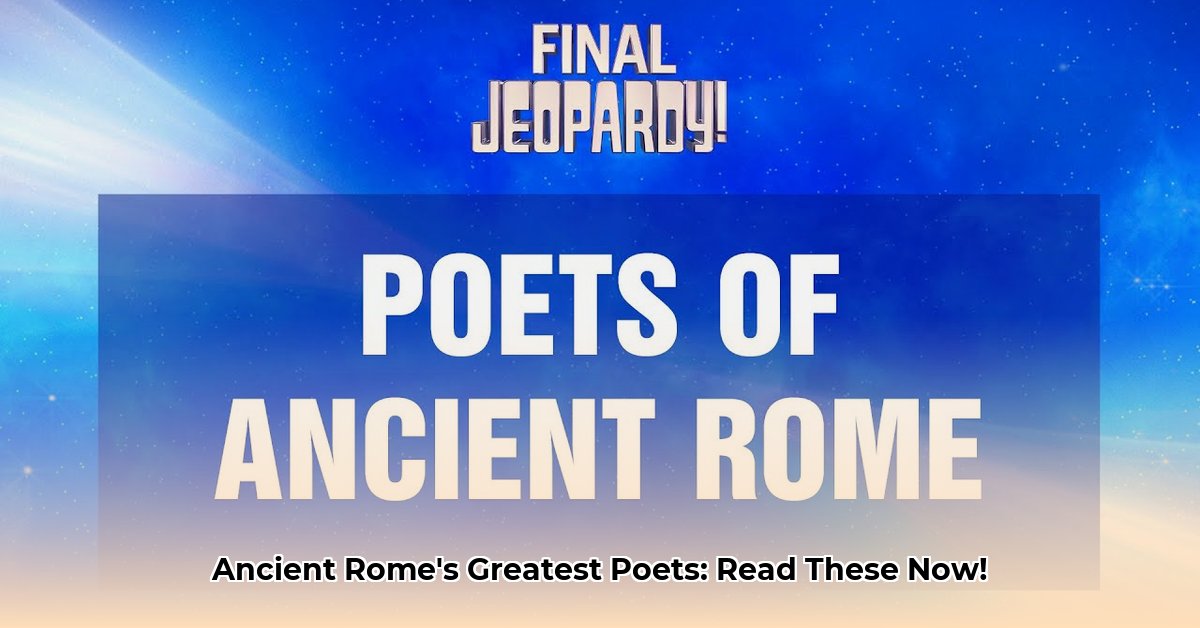
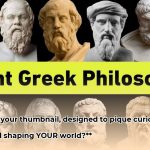


![Solved: Heads of Ancient Rome Crossword Clue (Feb 13, 2025) [Reference] heads_of_ancient_rome_edited](https://www.lolaapp.com/wp-content/uploads/2025/08/heads_of_ancient_rome_edited-150x150.jpg)

